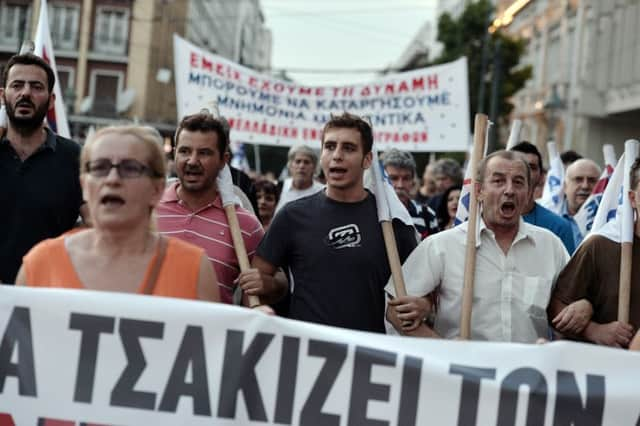Eurozone optimism after draft Greece bailout deal


The bill on the rescue deal was passed just in time for Greek finance minister Euclid Tsakalotos to head to Brussels to meet his counterparts from the 19-country currency union in the hope of getting their seal of approval as well.
The bailout is all that stands between Greece and a disorderly default on its debts – as soon as next week – that would force it out of Europe’s joint currency. The rescue package would give it about €85 billion (£60bn) in loans over three years in exchange for harsh spending cuts and tax hikes.
Advertisement
Hide AdAdvertisement
Hide AdGermany, Greece’s most influential creditor and harshest critic, was cautiously optimistic about the eurozone signing off on the bailout.
“I think that at the end of today we will have a result,” German finance minister Wolfgang Schaeuble said as he arrived for the talks. “If we don’t find a solution, we will have to do bridge financing,” he said, referring to a short-term loan so Greece can make its next debt payment on Thursday.
Jeroen Djisselbloem, who chairs the eurozone finance gatherings, said that the meeting “won’t be short,” but that “hopefully at the end of the evening we’ll have a positive outcome”.
The bill passed through the Greek parliament thanks to support from opposition parties, with 222 votes in favour, 64 against, 11 abstentions and three absent in the 300-member parliament.
Although approved by a comfortable majority, the result was a blow to prime minister Alexis Tsipras, who saw more than 40 of his 149 radical left Syriza party politicians vote against him. He has come under intense criticism from party hardliners for capitulating to the creditors’ demands for budget cuts – austerity measures he had promised to oppose when he won elections in January.
The bill includes reforms increasing personal, company and shipping taxes, reducing some pensions, abolishing tax breaks for some groups considered vulnerable and implementing deep spending cuts, including to the armed forces.
The mounting discord within Syriza is threatening to split the party and could lead to early elections. The stock market in Athens slid on the news and was down 2.4 per cent in afternoon trading.
Mr Tsipras was expected to call a vote of confidence in his government, but that was not confirmed.
Advertisement
Hide AdAdvertisement
Hide AdA government spokeswoman said any action would come after Thursday, when Greece has to make a large debt repayment to the European Central Bank.
Mr Tsipras has maintained his public popularity in Greece despite his U-turn on austerity policies, and consistently leads opposition parties in opinion polls.
An election would allow him to remove the hard line elements from his party, but it is not a risk-free option.
“An election in the next few months would create more political uncertainty, delay economic recovery and impede reform implementation and the possibility of opening talks on debt relief as desired by the [International Monetary Fund] as a condition of its involvement in funding the program,” said Joan Hoey, analyst for Europe at the Economist Intelligence Unit.
“However, it appears to be unavoidable if Greece is to have a government capable of implementing the agreement.”